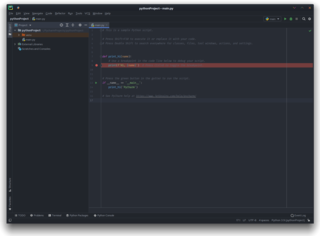An integrated development environment (IDE) is a software application that provides comprehensive facilities for software development. An IDE normally consists of at least a source-code editor, build automation tools, and a debugger. Some IDEs, such as NetBeans and Eclipse, contain the necessary compiler, interpreter, or both; others, such as SharpDevelop and Lazarus, do not.

Bluefish is a free and open-source software advanced text editor with a variety of tools for programming and website development. It supports coding languages including HTML, XHTML, CSS, XML, PHP, C, C++, JavaScript, Java, Go, Vala, Ada, D, SQL, Perl, ColdFusion, JSP, Python, Ruby, and shell. It is available for many platforms, including Linux, macOS and Windows, and can be used via integration with GNOME or run as a stand-alone application. Designed as a compromise between plain text editors and full programming IDEs, Bluefish is lightweight, fast and easy to learn, while providing many IDE features. It has been translated into 17 languages.

KDevelop is a free and open-source integrated development environment (IDE) for Unix-like computer operating systems and Windows. It provides editing, navigation and debugging features for several programming languages, and integration with build automation and version-control systems, using a plugin-based architecture.

PyQt is a Python binding of the cross-platform GUI toolkit Qt, implemented as a Python plug-in. PyQt is free software developed by the British firm Riverbank Computing. It is available under similar terms to Qt versions older than 4.5; this means a variety of licenses including GNU General Public License (GPL) and commercial license, but not the GNU Lesser General Public License (LGPL). PyQt supports Microsoft Windows as well as various kinds of UNIX, including Linux and MacOS.
This article provides basic comparisons for notable text editors. More feature details for text editors are available from the Category of text editor features and from the individual products' articles. This article may not be up-to-date or necessarily all-inclusive.
The Mozilla application framework is a collection of cross-platform software components that make up the Mozilla applications. It was originally known as XPFE, an abbreviation of cross-platform front end. It was also known as XPToolkit. To avoid confusion, it is now referred to as the Mozilla application framework.

Code::Blocks is a free, open-source cross-platform IDE that supports multiple compilers including GCC, Clang and Visual C++. It is developed in C++ using wxWidgets as the GUI toolkit. Using a plugin architecture, its capabilities and features are defined by the provided plugins. Currently, Code::Blocks is oriented towards C, C++, and Fortran. It has a custom build system and optional Make support.

Scintilla is a free, open source library that provides a text editing component function, with an emphasis on advanced features for source code editing.
Notable issue tracking systems, including bug tracking systems, help desk and service desk issue tracking systems, as well as asset management systems, include the following. The comparison includes client-server application, distributed and hosted systems.

Aptana, Inc. is a company that makes web application development tools for use with a variety of programming languages. Aptana's main products include Aptana Studio, Aptana Cloud and Aptana Jaxer.
The following tables list notable software packages that are nominal IDEs; standalone tools such as source-code editors and GUI builders are not included. These IDEs are listed in alphabetic order of the supported language.

Komodo IDE is an integrated development environment (IDE) for dynamic programming languages. It was introduced in May 2000. Many of Komodo's features are derived from an embedded Python interpreter.

Geany is a free and open-source lightweight GUI text editor using Scintilla and GTK, including basic IDE features. It is designed to have short load times, with limited dependency on separate packages or external libraries on Linux. It has been ported to a wide range of operating systems, such as BSD, Linux, macOS, Solaris and Windows. The Windows port lacks an embedded terminal window; also missing from the Windows version are the external development tools present under Unix, unless installed separately by the user. Among the supported programming languages and markup languages are C, C++, C#, Java, JavaScript, PHP, HTML, LaTeX, CSS, Python, Perl, Ruby, Pascal, Haskell, Erlang, Vala and many others.

CodeLite is a free and open-source IDE for the C, C++, PHP, and JavaScript (Node.js) programming languages.

PyCharm is an integrated development environment (IDE) used for programming in Python. It provides code analysis, a graphical debugger, an integrated unit tester, integration with version control systems, and supports web development with Django. PyCharm is developed by the Czech company JetBrains.
Ace is a standalone code editor written in JavaScript. The goal is to create a web-based code editor that matches and extends the features, usability, and performance of existing native editors such as TextMate, Vim, or Eclipse. It can be easily embedded in any web page and JavaScript application. Ace is developed as the primary editor for Cloud9 IDE and as the successor of the Mozilla Skywriter project.

Natron is a free and open-source node-based compositing application. It has been influenced by digital compositing software such as Avid Media Illusion, Apple Shake, Blackmagic Fusion, Autodesk Flame and Nuke, from which its user interface and many of its concepts are derived.








